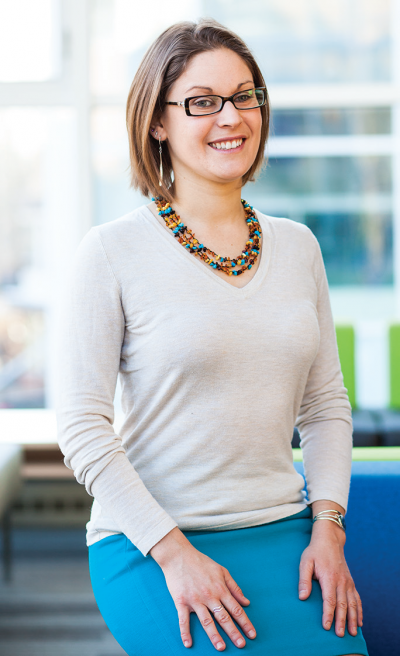
Photo: Pat Piasecki
Jessi Rosinski MBA’15
This past fall, Babson students once again collaborated with the town of Needham to enhance its downtown area and boost local businesses. The Management Consulting Field Experience (MCFE) team that worked on the project comprised six undergraduates and a graduate project leader.
The MCFE was the second for the town, which had completed a similar project the previous academic year. In its final analysis, the original MCFE team noted potential obstacles, such as limited parking, to increasing business traffic in the downtown area, and it also suggested enhancements, including free Wi-Fi and community events. Both teams worked with Devra Bailin, the town’s economic development director, but the new team focused more tightly on marketing improvements and ideas that would expand the area’s customer base. It also was tasked with educating the community about the importance of supporting local, independently owned businesses. “There was no duplication of effort,” says Jessi Rosinski, MBA’15, the team’s project leader. “We were able to integrate the first team’s info and benefit from their experiences to inform our starting point.”
Rosinski’s main concern was to empower the team, as well as help the students prioritize and learn how to deal with ambiguity. “I acted as a facilitator to encourage their best work by providing general structure and support,” she says, “but I was committed to having the team own the project. It was important that they, as seniors stepping out into their professional lives, learn how to manage tasks, time, and team dynamics.”
Overall, the team presented a brand concept and implementation strategy for Needham, and it proposed ideas to strengthen ties among merchants and bonds with the local community. Derishai Gordon-Staton ’15, a three-time MCFE team member, says, “We wanted to think of all the aspects that could possibly encourage more consumers to visit Needham for shopping and dining. But we saw infrastructure issues that couldn’t be changed without time-consuming government involvement—such as signage—so we prioritized the suggestions that could be immediately actionable.”
Ideas included holding a family-themed film festival in the town hall to draw residents downtown. Team member Alexander Isely ’15 says, “We actually came up with the suggestion, but when we had a meeting with the Needham Business Association, we learned that they, too, were considering implementing this event, so we took that as a sign to further develop it.”
The team also proposed a receipt program to encourage customers to remain in town or return for more business. Participating merchants would print discount coupons on receipts so customers might take advantage of the discount at another participating business. “The receipt program was well-received,” says Isely. “It was a solid step toward the goal of getting stores and restaurants to work together.”
The students were challenged to be creative and yet respectful of each business and its particular needs. “It was important for us as a group to understand that while MCFE is an incredible learning experience, it is only one semester of our lives,” says Isely. “These small-business owners are the soul and spirit of this town, and this is their lives. So we had to be mindful about affecting their ability to do business and be sensitive to what they needed.”
At the end of the project, Rosinski was impressed with the team’s progress and believes both the students and Needham gained from the experience. “Any project of this magnitude requires entrepreneurial thinking, critical decision-making skills, and flexibility,” she says. “The team did a great job of navigating the project with a high degree of respect for each other and professionalism. In addition to the solutions presented by the team, the town gained fresh perspectives, opportunities for conversation about challenges, and new friends.” —Sharman Andersen
